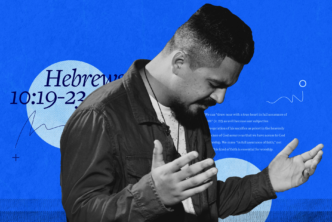A Priori is a series in which we put three simple questions to scholars undertaking important research in biblical studies, theology, ethics, and more. This week we hear from Ryan Hurd and his work on the Trinity.
1. Who are you, where did you study, and what work have you published so far?
My name is Ryan Hurd, and I currently live in the northwest United States, where I am working on my research. I have completed extensive graduate work in theology, early modern (Post-Reformation) intellectual history, and biblical studies. I have published several articles on Post-Reformation theology, edited/co-edited a couple of books, and done a number of translations ranging in size. The most recent is the (forthcoming) volume with Lexham Press, translating all of Franciscus Junius’s disputations on Holy Scripture. I have a number of other translated volumes nearly finished: Amandus Polanus’s work on the attributes of God, Johann Alsted’s work on the nature of theology (essentially prolegomena), etc. And I have a few shorter books I am nearly finished with, on various aspects of theology.
2. What research/writing project are you currently working on that you are most excited about? Have you presented papers related to this topic, and can you give us a little taster from your writing?
My area of expertise is the doctrine of the Trinity. My current (and long-term) project is a full systematic treatment of the locus. While the work is heavily influenced by the patristics, particularly the Cappadocians, the volume attempts to be a constructive systematics that is culled and resourced from the highest point of development that has obtained for the doctrine—roughly what might be loosely termed the “scholastic” period of theology, c. 1200–1700. Thus my current daily work is laboring through all the work on Trinity during that time period, and allowing it to inform my own work on Trinity. E.g. I am right this moment working through Dominicus Bañez’s Scholastica commentaria in primam partem summae theologiae; Bartholomew Torres’s Commentaria in XVII quaestiones primae partis S. Thomae de Aquino; the Collegium Salamanca’s Cursus theologicus angelico doctori dicatus…vol. 2; Diego Ruiz de Montoya’s Commentaria et disputationes de SS trinitate; and Gregorius de Valentia’s De SS trinitate, as I proceed through the bibliography I have developed running roughly from Thomas (really, back to Lombard—) to the eclipse of neo-scholasticism.
Those familiar with the period of scholasticism might also be aware of the lament that it is, essentially, nitpicking at nothing or at least belabored far past the data of special revelation in Scripture. That charge perhaps obtains in some cases, but on the whole it is most certainly mistaken. I like to think of scholasticism’s relationship to Trinity as a highly detailed map that outlines the path and waystations for Christian meditation on who God is as Father, Son, and Spirit. The scholastics tell you of the curves and alert you to forks in the road, and give you “the plan” for what to do when you reach each one. Scholasticism represents a path well-trod by some of the most brilliant minds and godly hearts of history, concentrated over many, many cycles of rigorous academic development and refinement. As I see it, the scholastic period is of great advantage for my own personal and professional journey as I work to gain some understanding of this highest Christian mystery (cf. DB 1796).
While the twentieth century has seen some revival of Trinity work, this has been quite anemic from the perspective of the ages, not to mention much of it the last couple generations has been deeply confused or outright heterodox. My work then attempts a trinitarian resourcement but does not claim to be historical; it is systematics in the proper sense of the term, that recognizes the need for a contemporary re-speaking of God but firmly believes this must join the confession of the church universal, including that of past times and places.
3. Which readers is the final product intended for, and when do you anticipate we might see the fruit of your research in published form?
The volume is geared only for professional theologians who have advanced training in the doctrine of the Trinity. I am aiming for the volume to be in print in five to eight years’ time, Lord willing. More in the immediate future however, I am looking for the right publisher for a series of “working papers” on various aspects of Trinity, and hope to see that volume published in the next year or two.
Want to promote your research? Send an email to tavis.bohlinger@faithlife.com answering the three questions above. Contributions are published in the order they are received. We look forward to highlighting your work!




